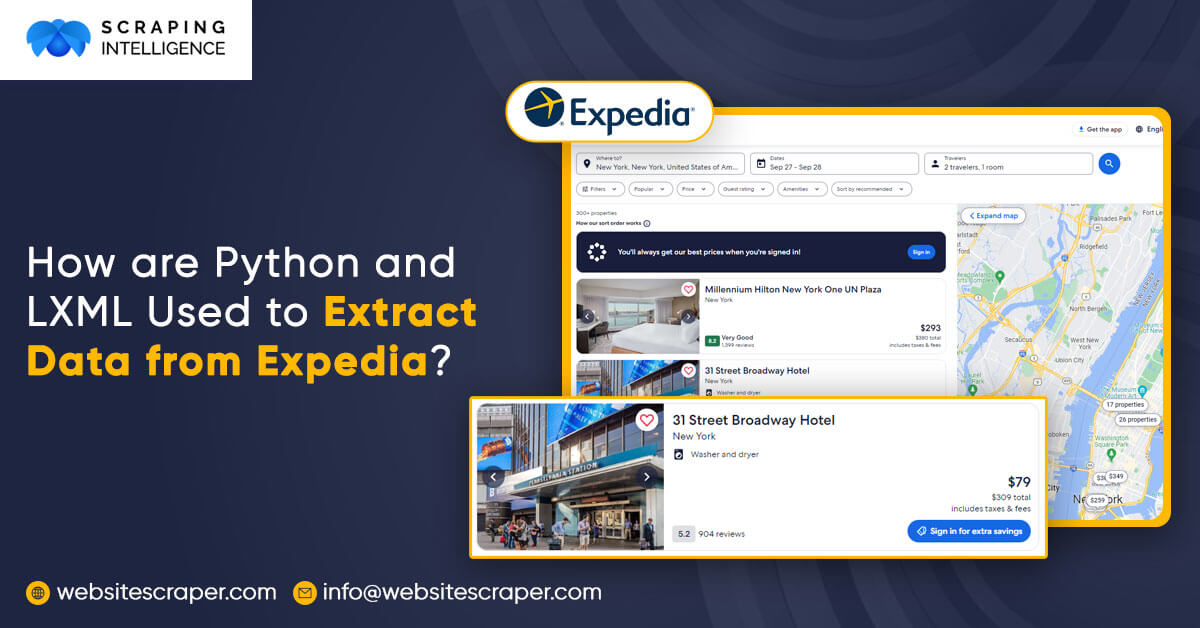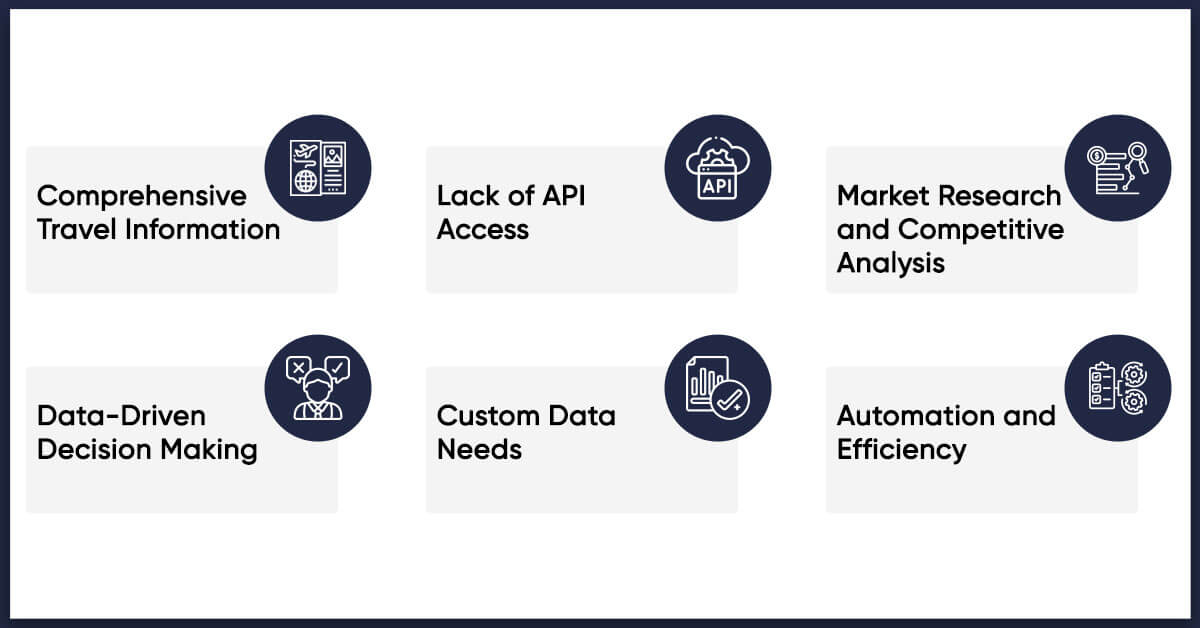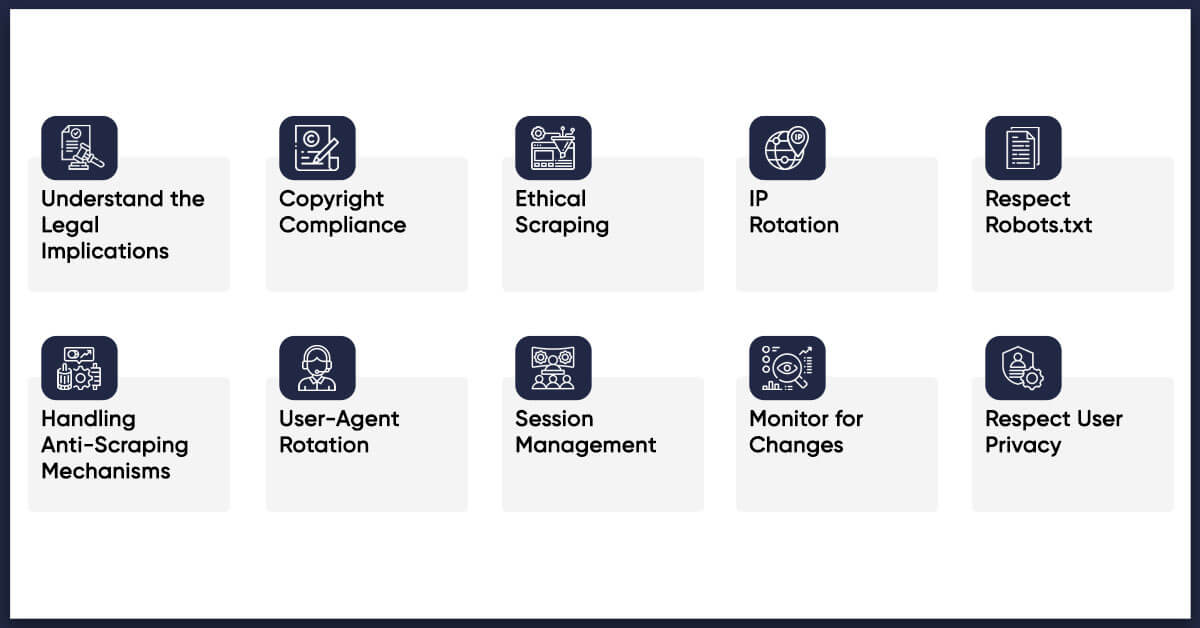
Data scraping is efficiently extracting data from web pages using a software program. When making travel plans, users may quickly compare rates on Expedia for lodging, flights, and vehicle rentals. Data scraping is using software tools to extract data from websites easily. Users can easily compare prices for hotels, planes, and rental cars on Expedia when planning their vacation. Data scraping is much better than going through the entire site and writing all the necessary info down on your own, clicking through every page.
What is Expedia Data Scraping?
Data scraping of Expedia is the process of utilizing bots or scripts to copy information from the Expedia website. This includes factors such as the price of the flights, availability of hotels, and the reviews, amongst others. Data scraping involves using a program that ‘goes through’ the pages for Expedia, takes the required information, and then processes it for use in other projects. Such data scraping is standard, especially in cases where one needs to monitor price changes, carry out comparative ratings, or collect massive amounts of information within a short period.
However, Data scraping can be a sensitive activity. Most businesses, such as Expedia, have specific rules of conduct that do not allow scraping due to the load it creates on the firm’s servers or invasion of user privacy. Therefore, one must take their time and look at the legal and ethical concerns before scraping any website. In this case, Expedia has APIs that allow developers to retrieve some data legally and with its permission, which developers appreciate.
Why Scrape Expedia Data?

Data scraping is the means of efficiently extracting information from websites through a software program. Furthermore, when making travel plans, customers can effortlessly check the rates on Expedia for accommodations, flights, or car rentals. Scraping Expedia travel data can be precious for several reasons:
Comprehensive Travel Information
Expedia is an online travel portal that provides comprehensive information on various travel services, including flight fares, accommodation, holidays and vacation homes, vehicle rentals, and more. Scraping this data can give a glimpse of the pricing, availability, and choices open for a product in that particular region at a given period.
Lack of API Access
However, unlike some platforms with developed APIs enabling developers to extract such data, Expedia does not have this. This is a limitation because obtaining a large data set regarding traveling is complicated for businesses, researchers, or developers. Such data can only be scraped from the web en masse to warrant data scraping as a technique for data collection.
Market Research and Competitive Analysis
Those working in the travel industry frequently may require information about market share, prices, or competitors' portfolios. Expedia data scraping makes it easier for firms to gather relevant and up-to-date data, thus making strategic decisions.
Data-Driven Decision Making
Any company providing travel services or products must analyze large datasets to determine the correct pricing or product development, improve customer satisfaction, and forecast market trends. Scraping Expedia enables these businesses to provide the most relevant and accurate data into their decision-making systems.
Custom Data Needs
At some point, the user may require data that cannot be acquired through manual navigation. Data scraping enables users to extract only the data they want, which cannot be easily done using a website's traditional Interface.
Automation and Efficiency
Trying to manually gather travel data from Expedia would take a very long time due to the large number of pages and listings available. Data scraping performs this much faster and without the need for many workers who would collect data by hand.
What are the Best Practices of Expedia Data Scraping?

Scraping Expedia travel data provides the audience with many valuable sources of details that are comprehensible for analysis, research, and strategic planning in the sphere of travel. Here are the best practices for delivering extensive Expedia datasets:
Understand the Legal Implications
Every website has Terms of Service, which is the rule book for using the site. Before you start scraping data from Expedia's site, you have to visit Expedia’s ToS section to see whether the company permits scraping. Some websites simply state on their homepage, ‘data scraping not permitted.’ If you disregard this warning, you risk the legal consequences.
Copyright Compliance
The content contained in a site can be eligible for copyright. This means that you can make no use of it at all or make limited use of it in a manner that was not prohibited when you acquired ownership over it. It is also important to avoid collecting all the details available to the general public without using a username and password. Do not scrape such details as a person’s booking or, for instance, reviews associated with a specific person.
Ethical Scraping
Do not use Expedia’s server to make too many requests simultaneously when scraping. They could flood their site with too many requests quickly, which will bog down their site or even potentially crash it, which can be considered inconsiderate to the rest of the site's users.
IP Rotation
Websites can inspect your IP address to determine where requests are coming from. This means that if you bombard them with requests from your IP, they may block your access. To prevent this, you need to use different IP addresses (proxies) so that the request appears to come from a different source.
Respect Robots.txt
Most websites depend on a file named Robots.txt, which instructs search engines and scrapers about the parts of the site that are accessible to them. Although it is not legally liable, adhering to guidelines is requisite out of respect for the website owner/manager.
Handling Anti-Scraping Mechanisms
When creating an account, purchasing, or commenting on the website, you must go through a CAPTCHA test to determine if you are a human being or a robot. You know, those things you come across sometimes before getting to a website; those puzzles, for instance. In your practice, you may encounter some CAPTCHAs; in that case, you will probably have to apply special tools or services to solve them or try to find a way around them.
User-Agent Rotation
A User-Agent is your browser’s identifier when it wants a website to send data. Crawlers or bots usually make too many requests with the identical User-Agent: if EXPEDIA recognizes you as such, you might be a bot. To turn around at User-Agents, you can make the requests appear to originate from different browsers or gadgets.
Session Management
When you enter a Website, it tends to create a session that logs your activities, and this is done using cookies. When you are scraping, do this so that the requests coming out there seem like they are made by a genuine user and not merely random hits.
Monitor for Changes
Websites change from time to time, either the design of the websites or how their web pages are formatted. This means that should there be some modifications to their HTML structure, the scraper you created using Expedia’s website will not function properly. Watch out for these changes so that you are in a position to make adjustments to your scraper.
Respect User Privacy
Do not scrape anything that can lead to an individual, such as name, email address, specific booking information, etc. It is also important to note that gathering this type of data directly conflicts with privacy laws such as the GDPR in Europe, putting the data collected at risk of legal action.
Conclusion
The Expedia scrapers can go to the website, study the information you’re interested in, and then retrieve it. This is especially useful when you want to gather lots of data, such as trends like prices over time or options for traveling to different places. Automating the collection of travel information from Expedia using Python and lxml has the potential to greatly assist businesses. lxml is a Python package that assists in the efficient retrieval of data from HTML or XML pages. With lxml, information on hotel prices, flight timings, and reviews available from Expedia can be easily extracted by businesses. This data extraction can in fact be specific to needs, for instance to know how a competitor is pricing his products or to know the changing trend in travel.
Incredible Solutions After Consultation
- → Industry Specific Expert Opinion
- → Assistance in Data-Driven Decision Making
- → Insights Through Data Analysis







